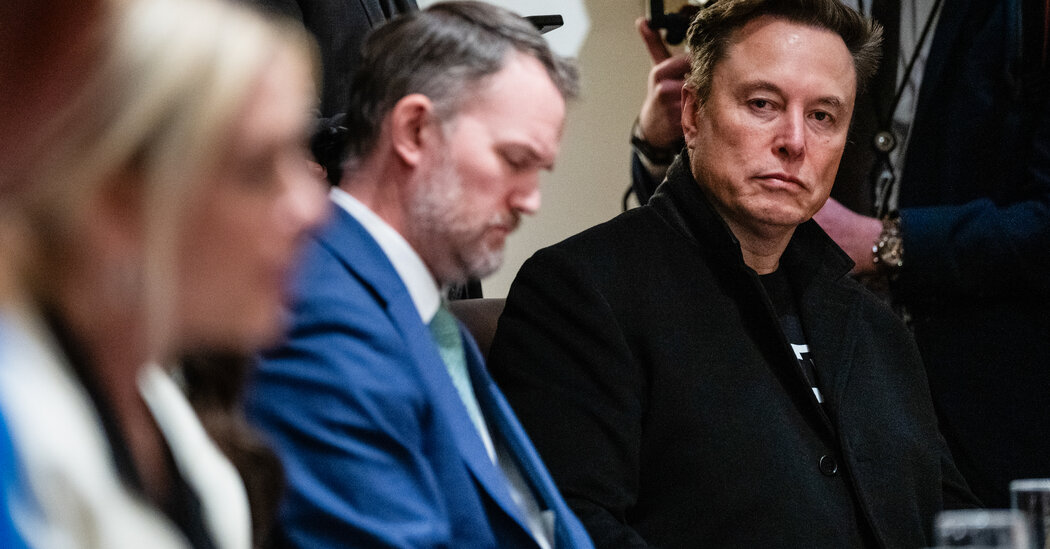A Manhattan federal judge ruled on Friday that one member of Elon Musk’s government efficiency program could have access to sensitive payment and data systems at the Treasury Department, as long as that person goes through appropriate training and files disclosures.
The order by the judge, Jeannette A. Vargas, came nearly two months after she had ruled that Mr. Musk’s team, members of the so-called Department of Government Efficiency, or DOGE, would be banished from the agency’s systems until the conclusion of a lawsuit that claims the group’s access is unlawful.
Friday night’s order partly dissolves the earlier preliminary injunction by granting Ryan Wunderly, who was hired as a special adviser for information technology and modernization, access to the Treasury systems in dispute, Judge Vargas wrote.
To gain the access, however, Mr. Wunderly will have to complete hands-on training “typically required of other Treasury employees granted commensurate access” and submit a financial disclosure report, the judge wrote.
The case stems from a lawsuit filed in February by 19 state attorneys general, led by Letitia James of New York, who sued to block the Trump administration’s policy of allowing political appointees and “special government employees” who work with Mr. Musk to access the systems. The systems contain some of the country’s most sensitive information, including Americans’ bank account and Social Security data.
The attorneys general argued that only career civil servants who have received training and security clearances should have access. The untrained members of Mr. Musk’s team should not have “unfettered access,” they said.
Judge Vargas had upheld a temporary injunction entered shortly after the lawsuit was filed. Her order barred the Treasury from giving DOGE access “to any payment record, payment systems, or any other data systems maintained by the Treasury Department containing personally identifiable information and/or confidential financial information of payees.”
In court, lawyers for the attorneys general said their concern was that Mr. Musk’s team intended to flag and pause Treasury payments based on an “ideological litmus test” and that to do so, the group had been given unlawful access to sensitive information, creating security risks.
At the time, the government rebutted those accusations, saying that only two DOGE members had been given access to the systems and that they had received some training. In addition, the government argued, the courts cannot usurp the powers given to President Trump as the chief executive.
In a March filing, the government said Mr. Wunderly had been appointed on Feb. 19 as a new Treasury Department employee to replace Marko Elez, who resigned after being linked to racist posts he made on the social media site X under a pseudonym. The government has said that Mr. Elez had mistakenly been given a higher level of access to Treasury data during his time.
Mr. Wunderly’s expertise is “critical to the Treasury DOGE Team’s efforts,” the government wrote, including responding to the Trump administration’s policy goals by cutting “improper and fraudulent payments.”
In the filing, the government said that Mr. Wunderly had undergone the typical training, vetting and security clearances for people with access to such sensitive systems.
On Friday, Judge Vargas acknowledged that her preliminary injunction had been ordered in part because of what the court identified as issues with the Treasury’s “hasty implementation and gaps in training” for the DOGE team members.
However, “based on existing record,” Judge Vargas wrote that the mitigation, training and vetting procedures that the government has detailed in its filings are adequate to satisfy her concerns.
Decisions and Verdicts,United States Politics and Government,Suits and Litigation (Civil),Courts and the Judiciary,Classified Information and State Secrets,Attorneys General,Federal Courts (US),Government Efficiency Department (US),Treasury Department,James, Letitia,Musk, Elon,Trump, Donald J,Vargas, Jeannette A
#Judge #DOGE #Member #Access #Sensitive #Treasury #Dept #Data
